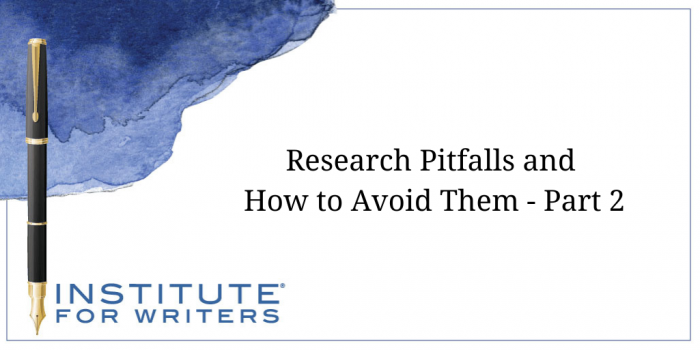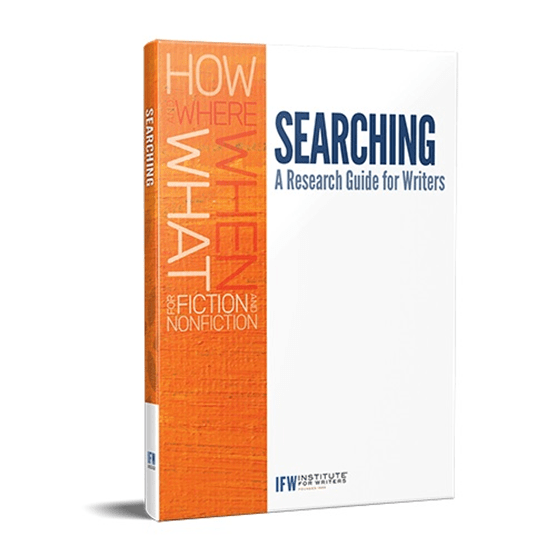1000 N. West Street #1200, Wilmington, DE 19801
© 2024 Direct Learning Systems, Inc. All rights reserved.

In last week’s post, Research Pitfalls and How to Avoid Them Part 1, Paula Morrow shared how not using your writing research in the right way can lead to rejection letters from editors. Today, Paula reveals even more ways to make sure you’re making that research work for you.

The Internet is both a blessing and a curse for the researcher. It’s quick, it’s easy, it’s even fun to run a web search. Using advanced searching techniques, you can find information on literally any topic. Find it, yes; trust it, not necessarily. You need to know that what you’ve found is reliable, current, and complete.
For example, in checking the references for a manuscript on an unusual travel article, I found a fascinating first-person account online. The material intrigued me, and I continued searching beyond the references in the article. Soon I discovered that same story repeated on four other sites and attributed to four different authors, each of whom claimed to have experienced it firsthand.
The Internet consists of surface web and deep web. The surface web consists of sites accessible through standard search tools such as Google or Bing. While this is the easiest layer to access, it consists of only a small fraction of all the content on the web— actually less than one percent! Searching only on the surface web may return hundreds or even thousands of hits, but the results will not be the most complete or reliable information.
The deep web, by definition, is not visible on the surface. Standard search engines work by using spider bots to crawl the web and index the content they can see. That excludes material that is password-protected, behind a paywall, in some format other than HTML, or invisible to bots for some other reason. While there is no exact figure on how much of the Internet those spider bots cannot index, a conservative guess is that 90 percent of the Internet is deep web.
Roughly nine percent of the web is inaccessible. This includes sites that have some idiosyncrasy such as an odd tag. Think of these as a misfiled sheet of paper in a giant filing cabinet. Other sites cannot be indexed because they are not known—for example, sites that are not linked anywhere. Don’t worry about this part.
Fortunately for writers, there are tools for searching the deep web. A good place to start is deep-web.org. Because the Internet is constantly growing and evolving, a list of links in a print publication is quickly outdated, but this portal site offers links to dozens of deep web directories, conveniently arranged by general and specialty categories.
When searching web directories, it’s important to determine the selection criteria for including each resource, whether the resource is reviewed or evaluated, and the targeted consumer of the directory listing. This allows you to select sources appropriate to your specific purpose.
Dealing with a familiar historical character and containing little known, surprising details, it was sure to fascinate readers. Even the bibliography looked good: a mix of books, articles, and websites.
Still, my colleague felt uneasy for reasons she couldn’t quite explain. She began tracking the sources and discovered that the unusual facts all came from a single online news article. The website was professional in appearance, but the credits were vague. Following the trail led, in a roundabout way, to a radical fringe group with a specific political agenda. The editor managed to find a phone number for one of their heavily quoted experts, interviewed him herself, and discovered that he was neither a scientist nor a historian. The “facts” quoted were theories that had subsequently been debunked by reputable researchers.
But the website looked so credible! Don’t be sucked in by a slick presentation; investigate the authority of your sources.

One science manuscript I received quoted a surprising statistic and cited a university web address. I checked the source and sure enough, the figure had been quoted accurately. The page looked odd, though, so I worked backward from there to determine the context. As it turned out, the page was part of a university-sponsored science fair project prepared by an 11-year-old child. Elsewhere in the presentation, he explained that he couldn’t find statistics he needed, so he made what he called an “educated guess.”
Accepting facts without verifying them can be disastrous. Another author sent me a piece on a certain species of animal on a small island. When asked to document a statement about the animal’s behavior, she phoned a naturalist on the island and learned that, in fact, that species doesn’t exist on that island. Her response was to suggest simply changing the name of the species in her manuscript. She seemed genuinely surprised when I rejected the submission.
Never accept a web page at face value; always check context. If the page includes a “home” button, click there to learn the sponsoring organization or individual. Written information always has an author; even if it appears to be anonymous, someone wrote it. If the home page doesn’t have the information you need, there are other ways to look for the authority:
If you pick up incorrect information, sooner or later someone is going to notice. To be blunt: if the publisher’s fact-checker catches it, you look foolish. If the fact-checker doesn’t catch it, the publisher will look foolish. Neither option is good for your writing career.
Editors are seeing a lot of manuscripts based on quick and easy research that’s superficial and, frankly, suspect in many cases. We urge authors to overcome their shyness or inexperience or whatever holds them back and get out there to do the necessary legwork. It may seem like extensive effort, but deep research can produce multiple articles in one area, which makes the time and effort worthwhile. It also builds credibility with editors, and believe me, that writer will be nurtured as a most-favored author.
You can use research for fiction as well as nonfiction! Go check out IFW’s book: SEARCHING: A RESEARCH GUIDE FOR WRITERS. For more practical research tips and techniques, go get it in the IFW Bookstore.
Paula Morrow has been a children’s literature specialist for over 30 years and still enjoys each new day in the world of children’s books and reading. Currently the editor of Highlights Hello magazine, she was formerly Executive Editor of Ladybug and Babybug magazines and edited titles for Cricket Books. Before becoming an editor, she was a children’s librarian. Before that she was a reader. She holds an MA in Library Science and a PhD in American Literature.
1000 N. West Street #1200, Wilmington, DE 19801
© 2024 Direct Learning Systems, Inc. All rights reserved.
1000 N. West Street #1200, Wilmington, DE 19801
© 2024 Direct Learning Systems, Inc. All rights reserved.
1000 N. West Street #1200, Wilmington, DE 19801
© 2024 Direct Learning Systems, Inc. All rights reserved.
1000 N. West Street #1200, Wilmington, DE 19801
© 2025 Writewell, LLC. All rights reserved.
1000 N. West Street #1200, Wilmington, DE 19801
©2025 Writewell, LLC. All rights reserved. Privacy Policy.
5 Comments